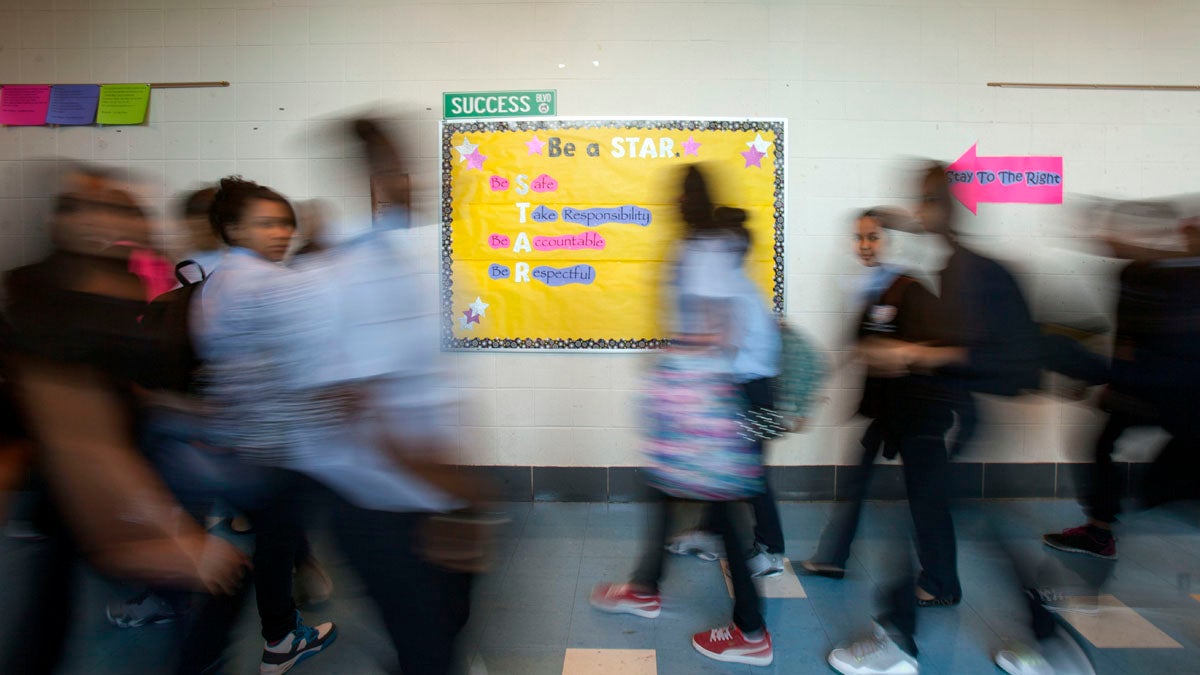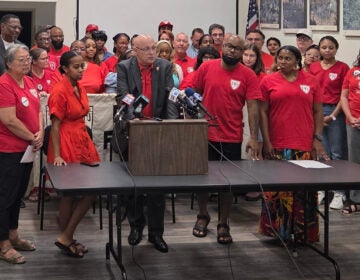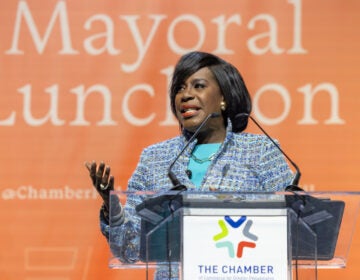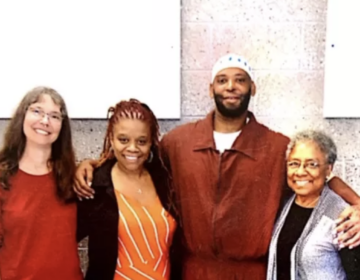New federal tax ‘loophole’ could stoke interest in private school donations in Pa.
A new analysis found wealthy individuals and high-profit businesses in Pennsylvania and nine other states may make money when they donate to private school scholarships.

Middle school students change classes (Jessica Kourkounis for WHYY, file)
Changes to the federal tax code could encourage more Pennsylvania businesses to pump money into K-12 private schools instead of paying state taxes.
That’s according to an analysis by the nonprofit Institute on Taxation and Economic Policy (ITEP), which says it discovered an expanded loophole in the new law.
By cross-referencing federal and state incentives, ITEP concluded that wealthy individuals and high-profit businesses across ten states — including Pennsylvania — may actually make money when they donate to private school scholarship funds.
This would seem like welcome news to the Commonwealth’s private schools and a blow to public school advocates. At least in the short term, though, it’s unclear if private schools would receive any benefit, even as their well-to-do benefactors make a handsome profit.
Here’s how the loophole works:
Pennsylvania and nine other states offer what are called education tax credits.
In Pennsylvania, a business can donate money to a private school scholarship organization or an educational nonprofit and receive up to 90 percent of that money back if that donation is made through the Educational Improvement Tax Credit (EITC) program or the Opportunity Scholarships Tax Credit (OSTC) program.
So if a business donates $10,000 to a scholarship fund, the business gets to eschew $9,000 in state taxes. That’s still a $1,000 net loss to the taxpayer, but there’s one more wrinkle.
The federal government also counts the scholarship donation as tax deductible, which means the business can write off the full donation on its federal taxes.
In the past, businesses might have been dissuaded from exploiting this loophole. That’s because the federal government also allowed unlimited deductions based on the amount of state tax a person or business paid. So if a person’s state taxes went down — as they would when participating in EITC or OSTC — their federal taxes would rise.
That’s where the new federal tax law comes in. Because the law caps state tax deductions at $10,000 a person, there’s no longer an incentive to pay state taxes past a certain point. That means more Pennsylvania businesses might want to take advantage of the tax credit programs and shed some of their state tax payments.
“Folks are finding they can get more back in tax cuts than they actually donated,” said Carl Davis, ITEP’s research director. “This is really taking the whole notion of charitable giving and putting it on its head.”
In some states, Davis expects this change will unleash a flood of new private school donations.
Pennsylvania, however, will probably not be one of those states.
That’s because the Commonwealth limits the availability of tax credits available through EITC and OSTC at $135 million and $50 million respectively. Right now, demand for those credits already exceeds supply.
“There are many more people wanting to utilize the tax credit than dollars available,” said Ina Lipman, whose nonprofit, Children’s Scholarship Fund Philadelphia, is among the state’s largest recipients of tax credit dollars.
Just because more businesses want to use the tax credits doesn’t mean there will suddenly be a lot more money available to organizations like Lipman’s. If anything, it simply means there will be more competition for the limited dollars available.
From the perspective of recipient organizations and private schools, this increased competition could even be a bad thing.
With the loophole expanded, businesses who have no real interest in private education or education issues may look to gobble up tax credits. (The credits, Lipman said, are awarded by lottery with some preference available to those who’ve used them in the preceding two years.) And if those businesses have no real interest in private education or education issues, they could divert their money elsewhere.
Here’s how:
In Pennsylvania, proponents and opponents of the EITC paint it as a pass-through for donations to private schools. But that’s an oversimplification.
Through the EITC program, businesses can donate money to scholarship organizations or entities considered “educational improvement organizations.”
These educational improvement organizations vary widely, and many have nothing to do with private schools. Some run after-school programs. Others provide extracurricular science education. And some give the money to traditional public schools or charter schools.
In other words, if businesses with no interest in private education jumped into the tax credit game, they could find plenty of other outlets for their dollars.
To be certain, the organizations that suck up the largest chunks of EITC money are scholarship organizations. But state numbers from Fiscal Year 2016 — the last year for which complete data is available — show that some educational improvement organizations have collected hundreds of thousands through tax credit donations.
(Full disclosure: WHYY received $3,500 in FY 2016 through EITC donations.)
Here are the ten scholarship organizations that received the largest EITC contributions:
| NAME | CONTRIBUTIONS RECEIVED |
| Business Leadership Organized for Catholic Schools | $4,547,940 |
| Foundation for Jewish Day Schools of Greater Philadelphia | $3,417,981 |
| Scholastic Opportunity Scholarship Fund | $2,701,554 |
| Pittsburgh Jewish Educational Improvement Foundation | $2,265,413 |
| Henkels Foundation | $2,229,096 |
| Children’s Scholarship Fund Philadelphia | $2,143,607 |
| Neumann Scholarship Foundation | $2,075,664 |
| STAR Foundation | $2,033,106 |
| Bridge Educational Foundation | $2,029,852 |
| Eastern Pennsylvania Scholarship Foundation – Diocese of Allentown | $1,910,806 |
And here are the ten educational improvement organizations that received the largest EITC contributions:
| NAME | CONTRIBUTIONS RECEIVED |
| Community Education Alliance of West Philadelphia | $833,333 |
| Project H.O.M.E. | $608,958 |
| The Pittsburgh Promise | $568,000 |
| The Delphi Project Foundation | $562,000 |
| KIPP Administrative Services Corporation | $424,159 |
| Harrisburg Public School Foundation | $373,583 |
| Big Brothers Big Sisters Independence Region | $367,000 |
| Congreso de Latinos Unidos, Inc. | $366,000 |
| Philadelphia Academies, Inc. | $360,000 |
| The Philadelphia Schools Project | $358,000 |
Davis, with ITEP, agreed that private schools in Pennsylvania don’t figure to benefit immediately from changes to the federal tax code.
“The biggest change here is going to be on the donor side of things, not necessarily for private schools or for state coffers,” he said.
But he does think increased interest in the EITC and OSTC programs could spur lawmakers to expand them. Republican leaders have already successfully pressed Gov. Tom Wolf to raise the EITC and OSTC caps, and Davis believes increased demand could strengthen the political argument for tax credit programs.
“It could potentially put pressure on lawmakers to raise the cap because we’re going to see … a lot more interest in the credits than there are credits available,” he said.
Davis thinks much of that interest will come from savvy accountants rather than education-minded philanthropists. Regardless of where the interest originates, Davis wrote in his analysis that “state lawmakers may be tempted to expand those programs to keep up with demand.”
Ultimately that brings us to the big-picture arguments over EITC, OSTC, and other voucher-like programs that funnel money into private schools.
School choice advocates say these scholarship programs allow private schools to enroll low-income students and expand options for poor families trapped in struggling public schools. Opponents say the siphoning of tax dollars weakens traditional public schools and steers the money to private schools with little accountability.
Right now, the tax changes in Washington exist only on the periphery of this heated local debate. But someday, they may play a more central role.
WHYY is your source for fact-based, in-depth journalism and information. As a nonprofit organization, we rely on financial support from readers like you. Please give today.






